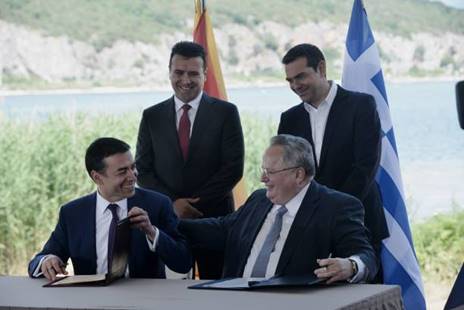Win-Win for Europe: Defending democracy in the Balkans – and in Poland

Leaders of Greece and Macedonia, Lake Prespa, 17 June 2018
"We are here to heal the wounds of time, to open a path for peace, brotherhood and growth for our countries, the Balkans and Europe." (Alexis Tsipras)
Dear friends,
Last weekend history was made in the Balkans. Leaders of Greece and of what will now become the Republic of Northern Macedonia reached a compromise where a whole generation of their predecessors had failed. They showed how two nations can set aside grievances of the past. They offered a reminder of the power of the European Union to foster reconciliation after conflicts.
Only two years ago Macedonia made very different headlines. Ruled since 2006 by Nikola Gruevski, it was a country in which journalists were attacked and in which security services illegally wiretapped thousands of people. It had a government fostering a cult of ancient warriors and Alexander the Great to provoke the Greek neighbours. Tensions culminated in the storming of parliament by supporters of Gruevski in April 2017, attacking and injuring opposition MPs. Then a new government was formed under prime minister Zoran Zaev.
The agreement between Athens and Skopje reached last weekend offers a chance for a European and Balkan success. But is the EU currently in a state to seize it?
There are still big hurdles: in Skopje a two-thirds majority is needed in parliament to change the constitution. A referendum will be held in the autumn, which supporters of the agreement need to win.
A clear EU promise would be vital: that once all hurdles to implement the Prespa Agreement are overcome, accession talks with Macedonia will open later this year.
Is this likely to happen? Further enlargement is unpopular, especially in France and in the Netherlands. The doubts expressed in Paris and The Hague are rational: at a time when the rule of law is under attack inside the EU (from Poland to Hungary) letting any countries with weak legal systems become members would be reckless. Europe's liberal leaders – France's Emanuel Macron and the Netherland's Mark Rutte – should stick to a zero-tolerance policy on any erosion of the rule of law.
However, this needs to be a constructive policy. It cannot just be about the Balkans. Here, then, is how to defend the rule of law in 2018: first in Skopje, then in Warsaw.
Strictness and reform in the Balkans
On 26 September 2017 Emmanuel Macron spoke at Sorbonne University in Paris about the values of democracy and the rule of law: "They're non-negotiable, there can be no cherry-picking. On values, there can be no two-speed Europe. They are the catalyst for our unity and freedom." In the same speech Macron promised:
"When they [Western Balkans] fully respect the acquis and democratic requirements, this EU will have to open itself up to the Balkan countries."
On 17 April this year Macron told the European Parliament: "For my part I will only defend enlargement once there has been a deepening and reform of today's Europe."
This raises the question how progress in fighting corruption and strengthening the rule of law in the Balkans can best be brought about. And how the EU itself can be reformed – starting today – to ensure that it might cope with any further enlargement at some point in the future.
It is obviously not enough simply to open accession talks for reforms to happen. Declaring a country to be a candidate or opening chapters have also not turned out to be sufficient to ensure reforms. One only needs to look at the experience of the past decade in South East Europe to see this clearly.
Turkey opened accession talks with the EU in 2005. This did not stop a dramatic decline in its rule of law and the respect of basic human rights. Macedonia was declared a candidate for EU accession in 2005; this did not stop a steep decline in its democracy only a few years later. Serbia opened its negotiations in 2014. Most EU observers today consider the results achieved in the rule of law modest, if not disappointing. Nobody will benefit if the same happens in Macedonia.
At the same time, putting things on hold risks making matters worse. The prospect of a return of illiberal nationalist ideas – at a time of a return of openly racist politics, from Trump's US to the ascendant far-right in the EU itself – is real. This would be devastating in a multi-ethnic, multi-religious region like the Balkans. In the past there was a lot of talk about the Balkans importing stability from the EU. At this moment the likelihood of the region importing toxic politics from the EU looks more likely. Defenders of human rights and stability in Europe have every interest to make sure this does not happen.
Demand more: transparency, inspections
France, the Netherlands, Germany and others need to do more than put things on hold. They need to propose a constructive policy which is tougher, more transparent, and more credible than the current accession process.
Macedonia offers a good hint how this might work. In September 2017 an international expert group under former German judge and retured EU official Reinhold Priebe issued a tough public assessment of the state of democracy in Macedonia. Paris could insist on a follow-up mission to be sent to Skopje already this autumn, immediately after the referendum on the name, and in parallel to the opening of talks.
Member states should second their own best experts. They should insist that the report is made public, as the two previous Priebe reports were, to great effect. And they should make the production and publication of such reports a regular element in the accession process.
This tougher approach should not stop with Macedonia. A similar format should be institutionalised for all Western Balkan countries, including Albania and Bosnia and Herzegovina: expert missions examining in detail how rule of law institutions practically function, not just on paper but in reality. Is there effective parliamentary control of the intelligence services in Serbia? Are courts independent in Montenegro? This year in May EU member states met in Sofia and called for "rule of law advisory missions with increased support from Member States and from the EU" and for "monitoring of reforms through more systematic, case-based peer-review missions" in the Balkans. A French initiative on this would help everyone.
There is also a strong case to be made for a better targeted fight against corruption. The EU itself developed a good tool to focus efforts in 2014, when it published its first EU Anti-Corruption Report, offering an in-depth unflinching look at corruption in member states. Such reports should be produced in all Western Balkan countries starting this autumn. Macedonia is ready. As Prime Minister Zoran Zaev put it in Brussels in December 2017:
"Macedonia would like to be subjected to the in-depth methodology for measuring corruption developed by Commissioner Malmstrom for use within the EU. We are not afraid to be assessed objectively, and if this helps produce as little corruption in Macedonia as in Scandinavia everyone wins. The citizens above all."
The most important factor behind painful reforms is transparency leading to exposure and public pressure. The French government is right: any perception of countries with a weak commitment to the rule of law joining the EU must be avoided. The EU itself is too fragile. Any negotiations need to strengthen, not weaken, the EU itself.
The right policy for the EU and Macedonia is to offer a conditional yes. This week the highly-demanding Dutch parliament rejected a motion to block accession talks with Macedonia this year. The door is open for the Dutch government to support the offer of opening talks to increase support for the Prespa agreement. France should do the same. It is also the right policy to hedge against serious risks:
- The risk of undermining a peace project of regional and internal reconciliation that France did much to promote after violence broke out in 2001. French politicians and diplomats like François Léotard and Alain Le Roy played a key role in bringing Macedonia back from the brink by helping to negotiate the Ohrid agreement.
- The risk of alienating Greece, other South East European members of the EU, and even Germany by blocking Macedonia. There is broad support for sending a signal to voters in Macedonia on the eve of tough decisions. At a time when France needs allies, it should not undermine the vital interests of other EU members in a stable Balkans.
The battle over Polish rule of law

Former Polish presidents, prime ministers, foreign ministers and leaders of the anti-communist opposition
A few days ago former Polish presidents, prime ministers, foreign ministers and dissidents published an appeal under the title: Europe, defend the rule of law in Poland!
"The last administrative level that can defend the law and order in Poland is the European Union. There will be no democratic Poland without the rule of law. There will be no European Union without principles. There will be no freedom without law and order."
This is an appeal that deserves to be heard. And there are European leaders who are in a position to act.
On 2 March 2018, Dutch prime minister Mark Rutte warned in Berlin:
"Erode the rule of law and you erode the single market. Erode the single market and you erode the Union. That's why it's vital for countries to do what they've agreed. A deal is a deal."
On 10 May 2018 Emanuel Macron warned in Aachen:
"Today we are facing a lot of anger and uncertainty, we are confronted with temptations and sometimes the worst, the abandoning of the very foundations of our democracies and our states of law. Let us not give in. Let us not give up any of our principles in the European Union, from the Council of Europe to the rule of law."
These are fine words. How can they be applied to the current serious crisis of the rule of law in Poland? Three weeks ago ESI and Foundation Batory published a report on this crisis. We noted that:
"no member state of the EU has ever gone as far in subjugating its courts to executive control as the current Polish government has done. The Polish case is therefore a test whether it is possible to create a Soviet-style justice system in an EU-member state; a system where the control of courts, prosecutors and judges lies with the executive and a single party."
ESI-Batory paper: European tragedy – the collapse of Poland's Rule of law (29 May 2018)
In response Polish leaders claim that their judicial reforms meet European standards. The proper place to decide whether this is still the case in Poland is the European Court of Justice. But for this to happen the European Commission needs to take the law on the Supreme Court in Poland to Luxembourg. And member states such as France and the Netherlands should do the same, as set out in article 259 of the EU Treaty.
The question is simple: are these standards, which the European Court of Justice defined in a recent court case, still upheld in Poland?
"The concept of independence presupposes, in particular, that the body concerned exercises its judicial functions wholly autonomously, without being subject to any hierarchical constraint or subordinated to any other body and without taking orders or instructions from any source whatsoever, and that it is thus protected against external interventions or pressure liable to impair the independent judgment of its members and to influence their decisions."
Why going to the Court is good for everyone
Is the European Commission about to capitulate? The Polish government certainly seems to expect this. On 11 June 2018 Adam Bielan, the deputy speaker of the Senate, told a radio station (Wirtualna Polska) that "The EC now has more important problems than the rule of law in Poland." Bielan noted that Poles should not be too worried about the EU procedure, and that the European Commission now has more serious issues to resolve.
He is right. The European Union is facing a huge number of challenges, from Brexit to migration, from the global trading system to the next EU budget. Nobody wants to spend months quarreling with an important EU member. This is an argument not to proceed to an up-or-down vote on Polish rule of law in the Council, where in the end Hungary and others would certainly block any sanctions.
The best way forward now is to go to the European Court of Justice. This is good for the European Commission, which has been divided on the next steps. It is good for the Council. It is good for those who want to see red lines defined for other member states as well. And it is good for Poland – government and opposition. Assuming that the government believes its rhetoric that its reforms are in line with European practice, it has nothing to fear.
EU leaders speak a lot about the rule of law. In Poland they must show that they mean it. And in the Balkans, they must find mechanisms to promote it. Both are possible.
Best regards,

Gerald Knaus
Further reading: Macedonia
ESI and the Macedonian name issue: 2018 Brussels – 2017 Berlin – 2017 Skopje

Finally, the waiting ends?
April 2018: ESI newsletter: Making history? Macedonia and Elysium
July 2014: ESI report: Vladimir and Estragon in Skopje. A fictional conversation on trust and standards and a plea on how to break a vicious circle
References and sources to Godot in Skopje: www.vladimirandestragon.org
Further reading: Poland

Manfred Weber – Guy Verhofstadt – Udo Bullmann – Ska Keller – Gabi Zimmer
Joint letter by heads of of political groups in the European Parliament: Gabi Zimmer (ChairGUE/NGL), Ska Keller (Co-Chair Greens/EFA), Philippe Lamberts (Co-Chair Greens/EFA), Udo Bullmann (Chair S&D), Guy Verhofstadt (Chair ALDE), Manfred Weber (Chair EPP)
"We, the undersigned, urge you to do whatever possible to protect the independence of the judiciary in Poland. In particular, we urge you to immediately start an infringement procedure, in parallel to the Article 7 procedure, and refer the Polish Supreme Court Act to the European Court of Justice to stop the detrimental reform as soon as possible."


Lech Walesa Joseph Daul
Statement by Lech Wałęsa concerning the Supreme Court: There is no freedom without the rule of law (1 June 2018)
"The violation of the independence of Polish courts threatens very negative consequences, for Poland, but also for the entire European Union. The EU, which is the anchor of the Polish raison d'etat, cannot function without free courts in each member state. Just as in 1980 there could not be freedom without solidarity, so today there cannot be freedom without the rule of law!"
Open letter by European lawyers (8 June 2018)
"We believe that the time has come for the EU institutions, and the Commission in particular, to take urgent and decisive steps to respond to recent actions of the Polish government that constitute an assault on the rule of law in that country. The Law and Justice government has adopted laws relating to the courts, the National Council of the Judiciary and the Supreme Court which, when taken together, substantially undermine judicial independence and subordinate the judiciary to the governing party."
Statement by the EPP Political Assembly on the rule of law in Poland (5 June 2018)
"EPP remains alert at the fact that Poland is drifting away from the European Union. The Polish government is undermining the legitimate aspirations of the Polish citizens committed to European values and to the European Union. One of our greatest concerns is the independence of the Polish judicial system, with a clear separation of powers and the competences of a superior court. The EPP therefore calls on the European Commission to use all the instruments, including the Court of Justice of the European Union, to make sure that Polish government complies with the European law and standards."
Statement by the Association of Polish Judges "Themis" (6 June 2018)
"The Association of Judges "Themis" fully supports the conclusions of the [ESI-Batory] report stating that the independence of the judiciary in Poland is endangered to such an extent that immediate measures at any possible level are urgently required."
